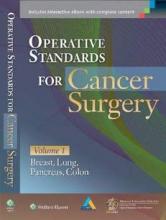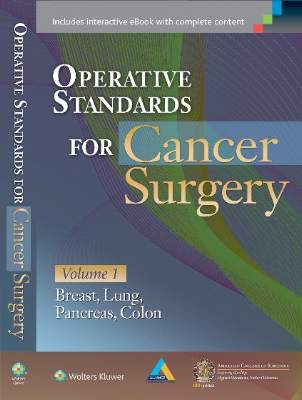User login
The American College of Surgeons (ACS) and the Alliance for Clinical Trials in Oncology (Alliance) present the first comprehensive, evidence-based examination of cancer surgery techniques that are critical to achieve optimal outcomes in a cancer operation. Operative Standards for Cancer Surgery, published in June by Wolters Kluwer, is a unique manual that focuses on best practices for breast, colon, lung, and pancreatic surgery, describing the surgical procedures that occur between skin incision and skin closure that directly affect cancer outcomes. The effort to develop a manual that details the critical elements of cancer surgery was first envisioned by Heidi Nelson, MD, FACS, Fred C. Andersen Professor and vice-chair, research, department of surgery, Mayo Clinic, Rochester, MN.
The textbook has been the main focus of the Cancer Care Standards Development Committee for the last three years, led by Kelly Hunt, MD, FACS, professor, department of surgical oncology, division of surgery, and chief, breast surgical oncology section, department of surgical oncology, University of Texas MD Anderson Cancer Center, Houston, and Program Director of the Alliance/ACS Clinical Research Program.
The manual provides concrete recommendations based on evidence of the proper conduct of operations and detailed information on the oncologic principles, avoidable pitfalls, and the quality of the evidence supporting the recommendations. Randomized trials have not addressed all components of operations within each disease site, Operative Standards draws on the experience and consensus opinion of the experts writing the individual chapters. Identifying the lack of evidence on certain topics has been an unintended consequence of writing this manual, and has galvanized the authors to establish standards. More than 120 surgeons contributed to the publication of this first edition, making it the best resource available on the proper conduct of an operation for cancer of the breast, colon, lung, and pancreas.
The authors describe several common but important operative procedures within each disease site. The manual focuses on oncologic fundamentals and critical elements in the conduct of the operation and intraoperative decision-making but it is not a surgical atlas. In addition, the participants identify controversies and pose several key questions that are analyzed with a systematic review of current literature. These questions might serve as the basis for a new clinical trial within each disease site. A leadership committee consisting of a section editor, a methodologist, and an art/illustrations editor reviewed each disease group. Surgeons with expertise in each disease site were recruited from national societies and cooperative groups to ensure broad representation. The authors also invited international experts to participate in each section. Much of the initial work was accomplished through conference calls followed by collaborative writing over a period of one-and-a-half years. This work culminated with a textbook, which will also be available online.
Anticipating continued evolution in surgical oncology, these initial four disease site sections will be updated every two to three years. Planning is already under way for the second edition of this manual and will include procedures in melanoma, gastric cancer, esophageal cancer, rectal cancer, and thyroid cancer.
Operative Standards for Cancer Surgery is available to order at http://www.lww.com/acs. Purchasers of the print edition will also receive the bundled interactive eBook edition, offering tablet, smartphone, or online access.
The American College of Surgeons (ACS) and the Alliance for Clinical Trials in Oncology (Alliance) present the first comprehensive, evidence-based examination of cancer surgery techniques that are critical to achieve optimal outcomes in a cancer operation. Operative Standards for Cancer Surgery, published in June by Wolters Kluwer, is a unique manual that focuses on best practices for breast, colon, lung, and pancreatic surgery, describing the surgical procedures that occur between skin incision and skin closure that directly affect cancer outcomes. The effort to develop a manual that details the critical elements of cancer surgery was first envisioned by Heidi Nelson, MD, FACS, Fred C. Andersen Professor and vice-chair, research, department of surgery, Mayo Clinic, Rochester, MN.
The textbook has been the main focus of the Cancer Care Standards Development Committee for the last three years, led by Kelly Hunt, MD, FACS, professor, department of surgical oncology, division of surgery, and chief, breast surgical oncology section, department of surgical oncology, University of Texas MD Anderson Cancer Center, Houston, and Program Director of the Alliance/ACS Clinical Research Program.
The manual provides concrete recommendations based on evidence of the proper conduct of operations and detailed information on the oncologic principles, avoidable pitfalls, and the quality of the evidence supporting the recommendations. Randomized trials have not addressed all components of operations within each disease site, Operative Standards draws on the experience and consensus opinion of the experts writing the individual chapters. Identifying the lack of evidence on certain topics has been an unintended consequence of writing this manual, and has galvanized the authors to establish standards. More than 120 surgeons contributed to the publication of this first edition, making it the best resource available on the proper conduct of an operation for cancer of the breast, colon, lung, and pancreas.
The authors describe several common but important operative procedures within each disease site. The manual focuses on oncologic fundamentals and critical elements in the conduct of the operation and intraoperative decision-making but it is not a surgical atlas. In addition, the participants identify controversies and pose several key questions that are analyzed with a systematic review of current literature. These questions might serve as the basis for a new clinical trial within each disease site. A leadership committee consisting of a section editor, a methodologist, and an art/illustrations editor reviewed each disease group. Surgeons with expertise in each disease site were recruited from national societies and cooperative groups to ensure broad representation. The authors also invited international experts to participate in each section. Much of the initial work was accomplished through conference calls followed by collaborative writing over a period of one-and-a-half years. This work culminated with a textbook, which will also be available online.
Anticipating continued evolution in surgical oncology, these initial four disease site sections will be updated every two to three years. Planning is already under way for the second edition of this manual and will include procedures in melanoma, gastric cancer, esophageal cancer, rectal cancer, and thyroid cancer.
Operative Standards for Cancer Surgery is available to order at http://www.lww.com/acs. Purchasers of the print edition will also receive the bundled interactive eBook edition, offering tablet, smartphone, or online access.
The American College of Surgeons (ACS) and the Alliance for Clinical Trials in Oncology (Alliance) present the first comprehensive, evidence-based examination of cancer surgery techniques that are critical to achieve optimal outcomes in a cancer operation. Operative Standards for Cancer Surgery, published in June by Wolters Kluwer, is a unique manual that focuses on best practices for breast, colon, lung, and pancreatic surgery, describing the surgical procedures that occur between skin incision and skin closure that directly affect cancer outcomes. The effort to develop a manual that details the critical elements of cancer surgery was first envisioned by Heidi Nelson, MD, FACS, Fred C. Andersen Professor and vice-chair, research, department of surgery, Mayo Clinic, Rochester, MN.
The textbook has been the main focus of the Cancer Care Standards Development Committee for the last three years, led by Kelly Hunt, MD, FACS, professor, department of surgical oncology, division of surgery, and chief, breast surgical oncology section, department of surgical oncology, University of Texas MD Anderson Cancer Center, Houston, and Program Director of the Alliance/ACS Clinical Research Program.
The manual provides concrete recommendations based on evidence of the proper conduct of operations and detailed information on the oncologic principles, avoidable pitfalls, and the quality of the evidence supporting the recommendations. Randomized trials have not addressed all components of operations within each disease site, Operative Standards draws on the experience and consensus opinion of the experts writing the individual chapters. Identifying the lack of evidence on certain topics has been an unintended consequence of writing this manual, and has galvanized the authors to establish standards. More than 120 surgeons contributed to the publication of this first edition, making it the best resource available on the proper conduct of an operation for cancer of the breast, colon, lung, and pancreas.
The authors describe several common but important operative procedures within each disease site. The manual focuses on oncologic fundamentals and critical elements in the conduct of the operation and intraoperative decision-making but it is not a surgical atlas. In addition, the participants identify controversies and pose several key questions that are analyzed with a systematic review of current literature. These questions might serve as the basis for a new clinical trial within each disease site. A leadership committee consisting of a section editor, a methodologist, and an art/illustrations editor reviewed each disease group. Surgeons with expertise in each disease site were recruited from national societies and cooperative groups to ensure broad representation. The authors also invited international experts to participate in each section. Much of the initial work was accomplished through conference calls followed by collaborative writing over a period of one-and-a-half years. This work culminated with a textbook, which will also be available online.
Anticipating continued evolution in surgical oncology, these initial four disease site sections will be updated every two to three years. Planning is already under way for the second edition of this manual and will include procedures in melanoma, gastric cancer, esophageal cancer, rectal cancer, and thyroid cancer.
Operative Standards for Cancer Surgery is available to order at http://www.lww.com/acs. Purchasers of the print edition will also receive the bundled interactive eBook edition, offering tablet, smartphone, or online access.

